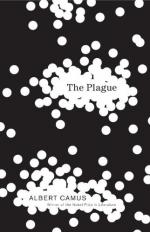|
|
The Plague Major Characters
Dr. Rieux: Dr. Rieux narrates the story, but he does not reveal this until the very end of the book. When the plague comes to Oran, Rieux works himself to exhaustion trying to relieve the suffering of the sick. His mind is always working, too, as he tries to understand why the plague has afflicted the innocent people of Oran. By the end of the book, with both his wife and his friend Tarrou dead, Rieux’s conclusion is that humans cannot understand suffering, only work to fight it.
Raymond Rambert: A young journalist who comes to Oran for a story and gets locked in when the epidemic arrives. Rambert has a wife in Paris that he desperately wants to return to, and he tries to escape the city with the help of smugglers. This is unsuccessful, so Rambert volunteers to work on the sanitary squads and fight the plague. He survives and is reunited with his wife at the story’s end.
Jean Tarrou: A visitor to Oran who becomes a close friend of Dr. Rieux’s. Tarrou lives in the town hotel and keeps a journal with his observations of the people of Oran--these observations help the narrator to tell the story. Tarrou has a strong moral code based on the conviction that no human being should ever put another human being to death, and he organizes the sanitary squads to help fight the plague in Oran. He dies of the disease near the very end of the epidemic.
Father Paneloux: A learned Jesuit priest in Oran who gives a fiery and vindictive sermon in the early days of the plague. As the plague spreads, Paneloux works as a volunteer to fight it. He later gives a second sermon that is much more sympathetic. He and Dr. Rieux get into several heated discussions about faith and suffering.
Joseph Grand: A friend of Dr. Rieux’s who is a lowly clerk in a municipal office by day and working to write the perfect novel, of which he has only finished one sentence, by night. Grand is sad and regretful about his wife, who left him long ago, and is referred to by the narrator as the 'hero' of the chronicle because of his ability to quietly endure. He keeps the books as the general secretary for the sanitary squads, and although he catches what seems to be the plague near the end of the story, Grand miraculously recovers and lives.
Cottard: Cottard committed a crime before the plague arrived in Oran and is happy as the epidemic escalates because the police are too busy too arrest him and he no longer has to suffer alone. He spends most of the book eating expensive meals and leaving big tips, but when the plague disappears, Cottard is struck again with fear and anxiety. In the end, he has a shooting fit and is dragged off to jail by the police.
Minor Characters
M. Michel: The concierge in Dr. Rieux’s apartment building and the first human character to die of the plague.
Mme. Rieux: Dr. Rieux’s wife; a thirty-year old woman who has been sick for a long time and leaves Oran for treatment before the plague arrives.
the asthma patient: An old patient of Dr. Rieux’s.
M. Othon: The very rule-bound magistrate of Oran.
Jacques: M. Othon’s son. He dies painfully from the plague in front of several important characters in the book.
Dr. Richard: Another doctor in Oran. Richard is often hesitant to take any dramatic action against the plague.
the cat man: An old man that Tarrou writes about in his diary who takes great delight in spitting on the neighborhood cats from his high window.
the Prefect: An official in town who must give approval before any major decisions or announcements about the plague are made.
Dr. Castel: Another doctor that Rieux often consults. He works on developing an anti-plague serum.
Mme. Rieux (elder): Dr. Rieux’s mother, who comes to live with the doctor just before the outset of the plague.
Jeanne: Joseph Grand’s wife, who left him long ago.
Garcia: The first smuggler that Cottard and Rambert discuss Rambert’s getaway with.
Gonzales: The main smuggler in charge of Rambert’s case.
Marcel and Louis: Two brothers who are guards at the city gates and are supposed to help Rambert with his getaway.
Tarrou’s mother: Tarrou loved his mother quite a lot. He describes her as 'self-effacing.'
Tarrou’s father: A man that Tarrou loved and respected and got along with well, until Tarrou saw him argue as a prosecuting attorney for the death of a criminal.




